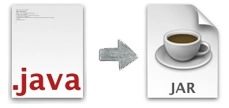In this tutorial, we will show you how to use Maven build tool, One-JAR plugin to create a single Jar together with its dependency Jars into a single executable Jar file, so called fat Jar.
Tools used :
- Maven 3.1.1
- JDK 1.7
- Joda-time 2.5
1. Create a simple Java project
Create a Java project from the Maven quick start template.
$ mvn archetype:generate -DgroupId=com.favtuts.core.utils -DartifactId=dateUtils
-DarchetypeArtifactId=maven-archetype-quickstart -DinteractiveMode=falseThe following files and folder structure will be created.
.
|____dateUtils
| |____pom.xml
| |____src
| | |____main
| | | |____java
| | | | |____com
| | | | | |____favtuts
| | | | | | |____core
| | | | | | | |____utils
| | | | | | | | |____App.java
| | |____test
| | | |____java
| | | | |____com
| | | | | |____favtuts
| | | | | | |____core
| | | | | | | |____utils
| | | | | | | | |____AppTest.javaMake it support Eclipse.
$ mvn eclipse:eclipseImports the project into Eclipse IDE.

2. Update Pom.xml
Update pom.xml to declare the jodatime dependencies. For output to a Jar format, make sure the packaging tag is set to ‘jar’. Read the comments for self-explanatory.
pom.xml
<project xmlns="http://maven.apache.org/POM/4.0.0"
xmlns:xsi="http://www.w3.org/2001/XMLSchema-instance"
xsi:schemaLocation="http://maven.apache.org/POM/4.0.0
http://maven.apache.org/maven-v4_0_0.xsd">
<modelVersion>4.0.0</modelVersion>
<groupId>com.favtuts.core.utils</groupId>
<artifactId>dateUtils</artifactId>
<packaging>jar</packaging>
<version>1.0-SNAPSHOT</version>
<name>dateUtils</name>
<url>http://maven.apache.org</url>
<properties>
<jdk.version>1.7</jdk.version>
<jodatime.version>2.5</jodatime.version>
<junit.version>4.11</junit.version>
</properties>
<dependencies>
<dependency>
<groupId>junit</groupId>
<artifactId>junit</artifactId>
<version>${junit.version}</version>
<scope>test</scope>
</dependency>
<dependency>
<groupId>joda-time</groupId>
<artifactId>joda-time</artifactId>
<version>${jodatime.version}</version>
</dependency>
</dependencies>
<build>
<finalName>dateutils</finalName>
<plugins>
<!-- download source code in Eclipse, best practice -->
<plugin>
<groupId>org.apache.maven.plugins</groupId>
<artifactId>maven-eclipse-plugin</artifactId>
<version>2.9</version>
<configuration>
<downloadSources>true</downloadSources>
<downloadJavadocs>false</downloadJavadocs>
</configuration>
</plugin>
<!-- Set a compiler level -->
<plugin>
<groupId>org.apache.maven.plugins</groupId>
<artifactId>maven-compiler-plugin</artifactId>
<version>2.3.2</version>
<configuration>
<source>${jdk.version}</source>
<target>${jdk.version}</target>
</configuration>
</plugin>
<!-- Make this jar executable -->
<plugin>
<groupId>org.apache.maven.plugins</groupId>
<artifactId>maven-jar-plugin</artifactId>
<configuration>
<archive>
<manifest>
<mainClass>com.favtuts.core.utils.App</mainClass>
</manifest>
</archive>
</configuration>
</plugin>
</plugins>
</build>
</project>
3. Get CurrentDate with JodaTime
Update the generated App.java with the following content :
App.java
package com.favtuts.core.utils;
import org.joda.time.LocalDate;
public class App {
public static void main(String[] args) {
System.out.println(getLocalCurrentDate());
}
//Print current date with JodaTime
private static String getLocalCurrentDate() {
LocalDate date = new LocalDate();
return date.toString();
}
}
4. Jar File
Maven package the project to generate the final Jar file. A new dateutils.jar is created in the $project/target folder.
$ mvn packageList out the jar content.
$ jar tf target/dateutils.jar
META-INF/
META-INF/MANIFEST.MF
com/
com/favtuts/
com/favtuts/core/
com/favtuts/core/utils/
com/favtuts/core/utils/App.class
META-INF/maven/
META-INF/maven/com.favtuts.core.utils/
META-INF/maven/com.favtuts.core.utils/dateUtils/
META-INF/maven/com.favtuts.core.utils/dateUtils/pom.xml
META-INF/maven/com.favtuts.core.utils/dateUtils/pom.propertiesTry to run this Jar file.
$ java -jar dateutils.jar
Exception in thread "main" java.lang.NoClassDefFoundError: org/joda/time/LocalDate
at com.favtuts.core.utils.App.getLocalCurrentDate(App.java:14)
at com.favtuts.core.utils.App.main(App.java:9)
Caused by: java.lang.ClassNotFoundException: org.joda.time.LocalDate
at java.net.URLClassLoader$1.run(URLClassLoader.java:366)
at java.net.URLClassLoader$1.run(URLClassLoader.java:355)
at java.security.AccessController.doPrivileged(Native Method)
at java.net.URLClassLoader.findClass(URLClassLoader.java:354)
at java.lang.ClassLoader.loadClass(ClassLoader.java:423)
at sun.misc.Launcher$AppClassLoader.loadClass(Launcher.java:308)
at java.lang.ClassLoader.loadClass(ClassLoader.java:356)
... 2 moreAbove is the expected error message, because the joda-time.jar is missing.
5. One-Jar Example
Update pom.xml to use One-Jar plugin, it will create a single Jar together with its dependency Jars.
pom.xml
<project>
<build>
<plugins>
<!-- Includes the runtime dependencies -->
<plugin>
<groupId>org.dstovall</groupId>
<artifactId>onejar-maven-plugin</artifactId>
<version>1.4.4</version>
<executions>
<execution>
<goals>
<goal>one-jar</goal>
</goals>
</execution>
</executions>
</plugin>
</plugins>
</build>
<!-- One-Jar is in the googlecode repository -->
<pluginRepositories>
<pluginRepository>
<id>onejar-maven-plugin.googlecode.com</id>
<url>http://onejar-maven-plugin.googlecode.com/svn/mavenrepo</url>
</pluginRepository>
</pluginRepositories>
</project>
Package it again, two jars will be created in the “target” folder – dateUtils.jar and dateUtils-one-jar.jar.
$ mvn packageThe dateUtils-one-jar.jar is the final fat-jar you want, list out the jar content :
$ jar tf target/dateutils.one-jar.jar
META-INF/MANIFEST.MF
main/dateutils.jar
lib/joda-time-2.5.jar
com/
com/simontuffs/
com/simontuffs/onejar/
.version
OneJar.class
com/simontuffs/onejar/Boot$1.class
com/simontuffs/onejar/Boot$2.class
com/simontuffs/onejar/Boot$3.class
com/simontuffs/onejar/Boot.class
com/simontuffs/onejar/Handler$1.class
com/simontuffs/onejar/Handler.class
com/simontuffs/onejar/IProperties.class
com/simontuffs/onejar/JarClassLoader$1.class
com/simontuffs/onejar/JarClassLoader$2.class
com/simontuffs/onejar/JarClassLoader$ByteCode.class
com/simontuffs/onejar/JarClassLoader$FileURLFactory$1.class
com/simontuffs/onejar/JarClassLoader$FileURLFactory.class
com/simontuffs/onejar/JarClassLoader$IURLFactory.class
com/simontuffs/onejar/JarClassLoader$OneJarURLFactory.class
com/simontuffs/onejar/JarClassLoader.class
com/simontuffs/onejar/OneJarFile$1.class
com/simontuffs/onejar/OneJarFile$2.class
com/simontuffs/onejar/OneJarFile.class
com/simontuffs/onejar/OneJarURLConnection.class
src/
src/com/
src/com/simontuffs/
src/com/simontuffs/onejar/
src/OneJar.java
src/com/simontuffs/onejar/Boot.java
src/com/simontuffs/onejar/Handler.java
src/com/simontuffs/onejar/IProperties.java
src/com/simontuffs/onejar/JarClassLoader.java
src/com/simontuffs/onejar/OneJarFile.java
src/com/simontuffs/onejar/OneJarURLConnection.java
doc/
doc/one-jar-license.txtOne-Jar plugin puts the runtime dependencies in the lib folder, for example lib/joda-time-2.5.jar, and the main jar in the main folder, for example main/dateutils.jar. In additional, it also creates many simontuffs classes to help loads the included Jars correctly.
Try to run the final fat-jar.
$ java -jar dateutils.one-jar.jar
2014-10-18Done.
Download Source Code
$ git clone https://github.com/favtuts/java-maven-tutorials.git
$ cd maven-one-jar/dateUtils$ mvn clean package
$ java -jar dateutils.one-jar.jar
